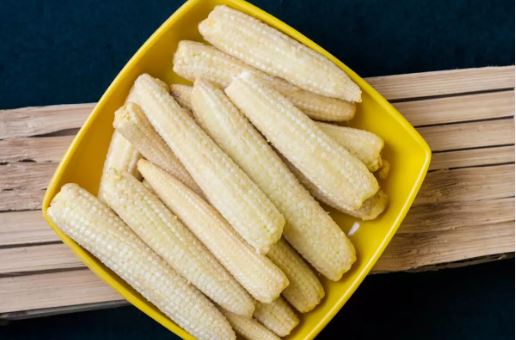Lifestyle
3 health benefits of baby corn and its culinary uses

Baby corn, cornlets or young corn are a cereal that comes from corn that is harvested early.
Baby corns are consumed along with their cobs and are eaten either raw or cooked.
Because the cob of baby corn is very soft, the raw kernels are not separated from the cob as done in the case of corn.
Baby corn is low in calories as compared to corn and has almost no fat. Baby corn is one of those vegetables that are healthy and can be added to your daily diet.
They have become an essential ingredient in Continental and Asian cuisines. It is used in salads and stir fries quite often.
Baby corn consists of a variety of nutrients such as vitamin A, B, C and E and as well as folate, thiamin and pantothenic.
We have laid down some health benefits of baby corn for you so that you can understand how important they are.
1. Can help during weight loss
As mentioned earlier, baby corn has almost no fat and is also low on calories. Therefore, while on a routine to lose weight, you can definitely add them in your meals. It also has a little less starch content as compared to corn and when you are trying to lose weight, you can eat baby corns raw, steamed or baked for maximum effects. The high fiber content in baby corns will keep regulating your bowel moments and will make your stool thick. It will keep you full for most of time because after fiber is consumed, it takes a lot of time to digest.
2. Helps to improve eyesight
In an era where we use screens so much on a daily basis, we must consume baby corns. Baby corns are rich in Vitamin A which helps to aid eye health. We can take care of our eyes by eating healthy foods that are a good source of vitamin A. Baby corns consist of carotenoids and tetraterpenoids. Carotenoids are a type of pigment found in plants and algae which gives it a yellow, red or orange colour. When it enters our body, it often converts into vitamin A. Symptoms of low levels of vitamin A in the body can lead to problems such as night blindness and fatal infections, which can be avoided if we consume baby corns.
3. Keeps our skin healthy
Human skin is very sensitive and needs proper care and nutrition. Our nails, hair and skin can never become healthy by just applying products on them. We need to eat healthy in order to make our skin, hair and nails healthy. Our skin usually gets affected from the dust, pollution and UV rays of the sun which can either make our skin dull, itchy or pigmented. Baby corns are one of those foods that we must consume if we wish to look after our skins because baby corn is rich in vitamin C that helps to repair skin cells and keeps the upper most layers of our bodies smooth, healthy, glowing and supple.
Other health benefits
Baby corns are rich in folate or folic acid that is essential during the period of pregnancy. A woman must consume baby corns during pregnancy because folic acid helps in the growth and development of the baby and as well as prevents the symptoms of abnormalities in the unborn child. The soluble fiber content present in baby corns help to lower the levels of cholesterol in our bodies and also reduces the possibilities of artery blockage. Some other nutrients that baby corns consist of are zinc, iron and calcium which further make the nutritional profile of baby corn strong.
Culinary uses of baby corn
Baby corn is one of the most popular vegetables that are added to stir fries in the Asian cuisine. You can also stir fry them along with some other vegetables, herbs and spices. You can add baby corns to fresh salads as it adds a unique and crunchy texture to the salad. Baby corns can also be added in soups or can be pureed to make baby corn soup. A popular snack which you make from baby corns is fries or fritters. You will just need to coat them with a batter of your choice and fry them. These snacks will turn out to be tasty and will be a healthy alternative for French fries. Baby corns can also be used in Chinese cooking and can be added in Manchurians as well as spicy vegetable curries.






